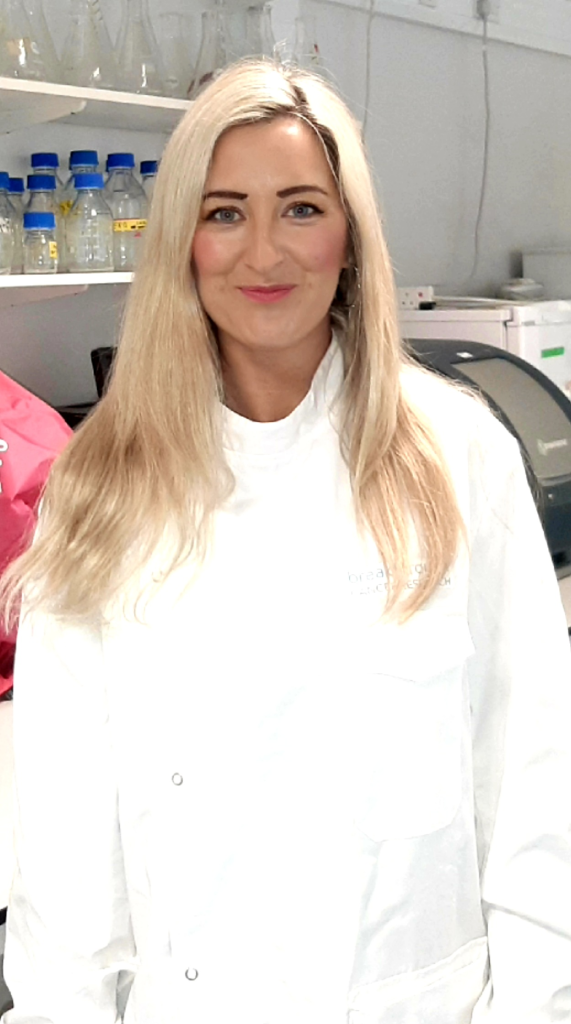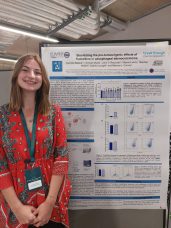Therapeutically remodelling the immune profile of ‘cold’ tumours in obesity associated cancer

People with cancer of the food-pipe (oesophageal cancer) receive treatments that only work for 30% of people. Therefore, approximately 70% of people with oesophageal cancer will not benefit from chemo-radiotherapy and urgently need new treatments. Our immune system is designed to kill cancer cells, but in people who have cancer the immune system is weakened.
PUTTING NATURAL KILLER CELLS – CANCER ASSASSINS – TO WORK FOR GOOD
Natural killer (NK) cells destroy cancer cells. However, in obese oesophageal cancer patients, NK cells are pulled into the visceral fat by a protein called fractalkine. Once in the fat, NK cells are profoundly altered and die before they can reach the tumour.
In oesophageal tumours, the highest obesity levels are linked to the lowest numbers of NK cells. We know a drug called a CX3CR1 antagonist targets the action of fractalkine and can block fractalkine from pulling NK cells into the fat.
Now Dr. Conroy and her team of researchers will test whether this drug can free NK cells from the fat so that they could move towards and kill oesophageal cancer cells. Through their research, we’ll also learn if NK cell therapies can be changed to bypass the fat and boost tumour destruction in oesophageal cancer.
Ultimately, we’ll learn if two new immunotherapies can improve survival in oesophageal cancer.
Caroline Marion is the PhD student working with Dr Conroy on this project.

Caroline Marion
The project has opened a fully-funded PhD position in Cancer Immunology.
We seek a highly motivated candidate for a Breakthrough Cancer Research/5For TheFight-funded 3-year PhD position in cancer immunology.
The successful candidate will perform research under the supervision of Dr Melissa Conroy and Professor Joanne Lysaght, School of Medicine, Trinity College Dublin. This exciting and highly translational project will focus on “Developing tumour-homing NK cell therapies for obesity-associated cancer.”
This research will focus on the development of a new and urgently needed treatment for the poor prognosis and obesity-associated malignancy of oesophageal adenocarcinoma (OAC). The PhD student will use in vitro and in vivo pre-clinical models to test the efficacy of novel immunotherapeutic approaches in OAC.
Qualifications: Applicants should hold an undergraduate degree or MSc in biomedical sciences, immunology, oncology, or a related discipline.
Skills and interests: The ideal candidate will have a passion for cancer research and immunology. He/she will ideally have experience in cell and tissue culture techniques, flow cytometry, and ELISA. Experience with in vivo models is preferable but not essential. The successful applicant will work within a large multidisciplinary team and therefore, a demonstrated ability to work as part of a team is essential. Candidates should demonstrate a high level of initiative, organisation, and strong written and oral communication skills.
How to apply
- Applications should be sent to: Dr Melissa Conroy ([email protected]), School of Medicine, Trinity College Dublin.
- Please include a 1-page Cover Letter that outlines your interest and experience in cancer research and/or immunology.
- Please also include a short 2-page Curriculum Vitae (please do not exceed 2 pages) and the name and contact details of 2 referees.
Applications Closing Date: 31st January 2024
Interviews: February 2024 via Zoom
Starting Date: March 2024
In this video Dr. Conroy explains how this research will work:
Research Findings
Publications
Mylod E, O’Connell F, Donlon NE, Davern M, Marion C, Butler C, Reynolds JV, Lysaght J, Conroy MJ. Real-time ex vivo monitoring of NK cell migration toward obesity-associated oesophageal adenocarcinoma following modulation of CX3CR1. Sci Rep. 2024 Feb 18;14(1):4017. doi: 10.1038/s41598-024-54390-5. PMID: 38369570; PMCID: PMC10874956.
Back








 Contact
Contact